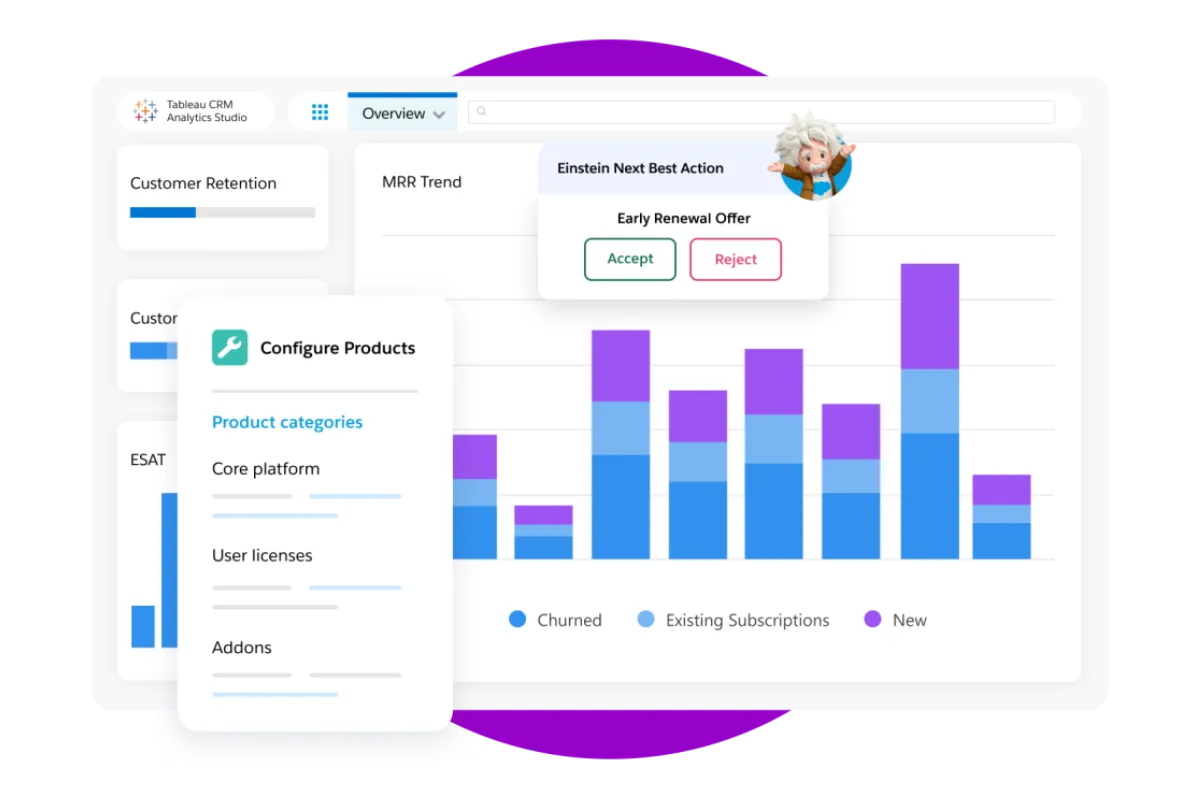Scaling Smarter: A Software Company Unifies Sales & Revenue Operations with Sales Cloud and Revenue Cloud (RCA)

The Challenges
A fast-growing software company in the vacation rental management space was hitting major roadblocks as it scaled. Its go-to-market tech stack — built around HubSpot — led to fragmented processes, limited visibility, and manual work that ultimately slowed growth.
As the company prepared for a new phase of hyper-growth, its existing systems and processes began to show their limits. Several key challenges stood in the way of operational efficiency and scalability:
Limited Scalability of Existing Tech Stack: The sales team relied heavily on HubSpot, which lacked the flexibility and customization needed to support more complex workflows and a growing sales operation.
Fragmented Sales Processes: Disconnected tools across our client’s tech stack resulted in inefficient lead handoffs, manual opportunity tracking, and inconsistent sales engagement.
Lack of End-to-End Visibility: Siloed data made it difficult for teams to gain a full picture of customer activity, pipeline progression, and sales performance.
Manual Quote-to-Cash Workflows: Without an integrated quoting and billing solution, the quote-to-cash process was slow, error-prone, and difficult to scale.
Inadequate Reporting & Insights: Leaders lacked access to reliable, real-time reporting, which limited their ability to make informed decisions and forecast revenue accurately.
The Solution
To overcome these challenges and prepare for scalable growth, the company partnered with Kelley Austin to implement Salesforce Sales Cloud and Revenue Cloud (RCA). Salesforce offered a comprehensive, unified platform that could support the company’s entire revenue lifecycle — from lead generation to deal close and ongoing subscription management.
By consolidating sales activities, automating quote-to-cash workflows, and integrating mission-critical tools, Salesforce enabled the company to eliminate silos, improve visibility, and operate with greater agility. The solution not only replaced the limitations of the previous tech stack but also provided a robust foundation for long-term innovation and growth.
Sales Cloud
The sales team was migrated from HubSpot to Sales Cloud, creating a centralized platform for managing leads, opportunities, and customer data. Key solutions included:
Lead Management: Configured a HubSpot to Salesforce integration to sync Salesforce Leads, Contacts and Accounts, enabling a smooth transition and more efficient lead handling.
Sales Engagement: Configured Sales Engagement, which includes features such as custom cadences, email templates, and call scripts.
Accounts & Contacts: Custom field mapping and layouts improved data accuracy and contextual visibility.
Opportunities: Multiple selling processes and tailored page layouts aligned with internal workflows.
System Integrations: Aircall, Gong, Velaris, Stripe, and Chili Piper were integrated to streamline communication and provide complete visibility across the sales cycle.
Reporting: Up to 10 custom reports and a dashboard were configured to deliver actionable insights for leadership.
Revenue Cloud (RCA)
Salesforce Revenue Cloud was implemented to unify and automate the company’s quote-to-cash process, supporting a recurring revenue model with high complexity. Key elements of the solution we developed included:
RCA Setup: The package was configured to support custom quoting, subscription tracking, and financial reporting needs.
Product & Pricing Management: More than 30 bundles and 200 SKUs were configured, supporting tiered and discounted pricing models.
Subscription Management: RCA now tracks all active products and contract terms, enabling better visibility into renewals and upsell opportunities.
PandaDoc & Stripe Integration: Streamlined contract generation and payment processing from opportunity close to invoicing.
Data Import: Over 250,000 records — spanning invoices, opportunities, products, and engagement data — were successfully migrated.
Customer Impact
By choosing Salesforce as the foundation of the tech stack, our client replaced a patchwork of disconnected tools with a single, unified Salesforce platform. This transformation gave teams a 360-degree view of the customer journey and a fully integrated system to support every stage of the sales and revenue lifecycle.
Compared to the limited flexibility of the company’s previous tech stack, Salesforce offered a far more powerful and scalable foundation — one that not only improved current operations but also positioned the business for continued growth. Key outcomes included:
Increased Sales Productivity: Sales reps now operate within a centralized environment that brings together lead engagement, opportunity management, communication tools, and pipeline insights — all in one place.
Faster Quote-to-Cash Cycle: Automating pricing, quoting, and payment processes significantly reduced manual work and accelerated revenue recognition.
Improved Visibility: With real-time dashboards and reliable reporting, leadership now has a clear line of sight into pipeline health, deal velocity, and customer behavior.
Scalable Growth: Salesforce’s modular architecture and robust ecosystem make it easier to expand into new markets, onboard new teams, and continuously evolve go-to-market strategies.
Ultimately, the move to Salesforce provided the company with a far more comprehensive solution than its previous tech stack. It brought sales, finance, and operations together in a single platform.
With this foundation in place, the company is now better equipped to scale and lead the market in vacation rental management software.

